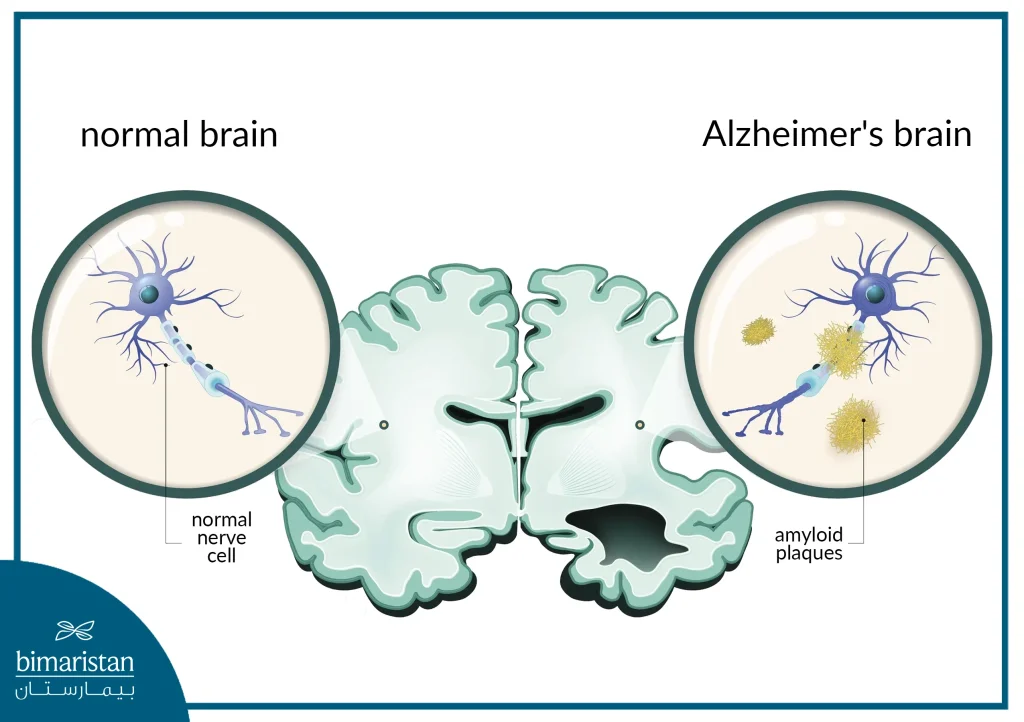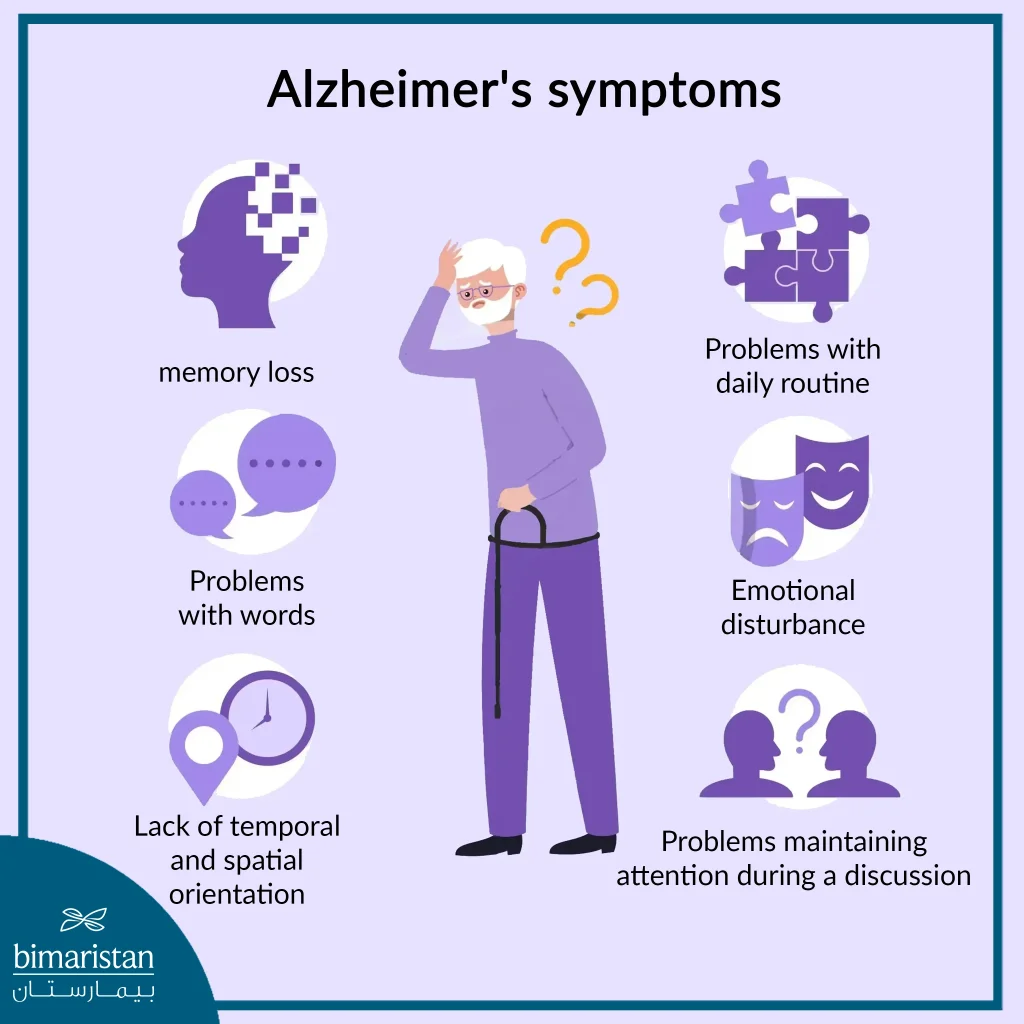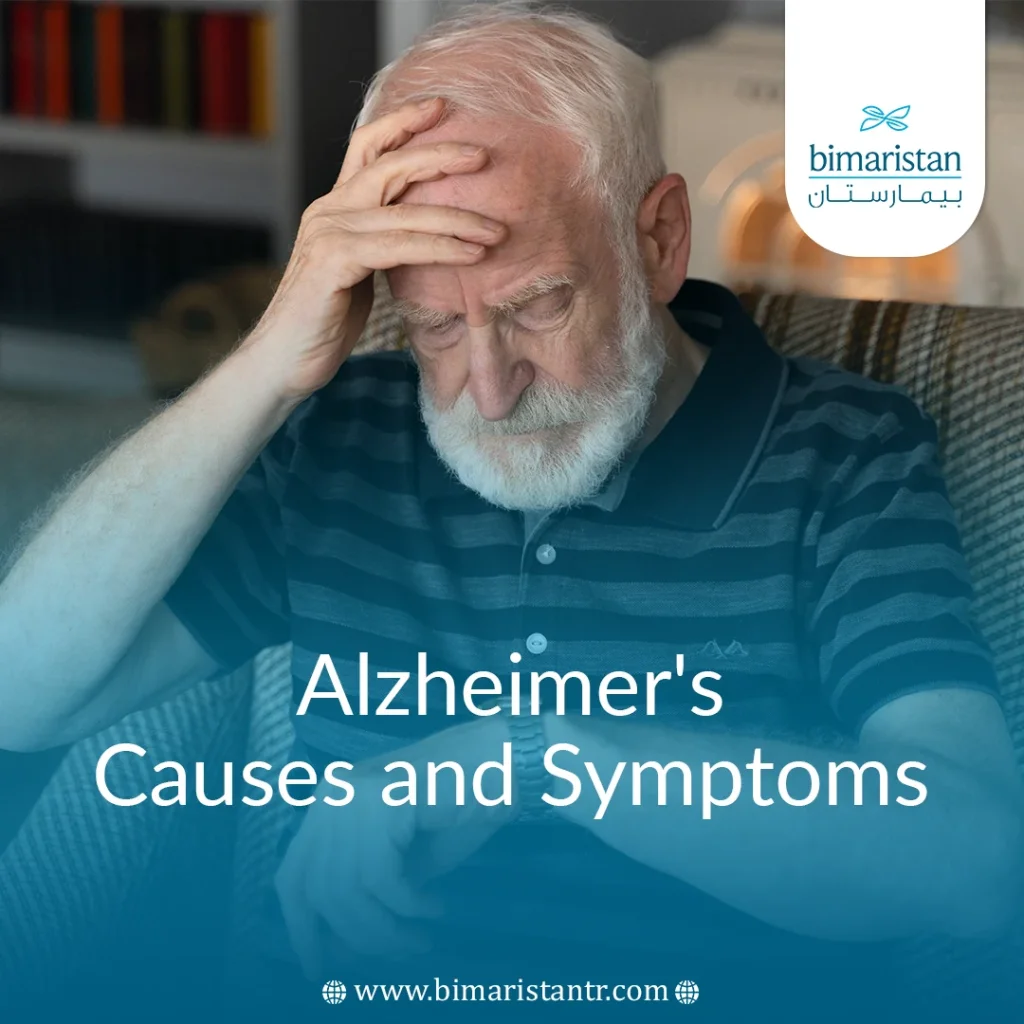The causes of Alzheimer’s disease are not fully known yet. In Alzheimer’s disease, brain cells are deprived of nutrients, so they die, and the brain deteriorates.
Alzheimer’s causes
There is a misconception that everyone who gets older will get Alzheimer’s disease (dementia). Alzheimer’s disease is a degenerative brain disease, meaning that it is a disease in which the brain’s neurons are destroyed (not a natural condition that occurs with aging).
An abnormal protein called amyloid plaques is formed in the human brain. These plaques (the protein that is formed) surround the nerve cells in the areas of the brain responsible for memory.
This surrounds the nerve cells and causes them to lose their connections with neighboring nerve cells. Over time, these surrounding cells die.
Due to the encirclement and death of these cells, some of the chemicals secreted by these cells to communicate with each other are lost. These lost chemicals are called neurotransmitters.
The most important neurotransmitter lost in Alzheimer’s disease is acetylcholine, responsible for attention, memory, and alertness. With its loss, we see the symptoms of Alzheimer’s disease.

Alzheimer’s disease is treated at Bimaristan Medical Center with Transcranial Pulse Stimulation (TPS), an effective method revealed by recent studies that relies on directing echo-like waves from outside the head (without shaving the hair) and is applied with high efficiency at Bimaristan Medical Center in Turkey.
Alzheimer’s Disease Predisposition
The factors that are considered to be the causes of Alzheimer’s Disease have not been completely determined yet. Still, the following are expected to be risk factors for Alzheimer’s disease that lead to the formation of amyloid proteins (causes of Alzheimer’s disease), including:
Advancing age
People over 65 years of age are more susceptible to Alzheimer’s disease (this does not rule out the possibility of it occurring at younger ages) because it takes a long time for symptoms to appear in the patient.
The gradual accumulation of abnormal proteins in the brain began a long time ago, and when brain cells die in large quantities, symptoms of Alzheimer’s disease begin to appear. Thus, aging may be one of the causes of Alzheimer’s disease in some people.
Family history and genetic factors
Having relatives in the family with Alzheimer’s disease increases your risk of infection. Some genes have been found accused of transmitting the disease in the family from parents to children, but it is not a hereditary disease for sure; it only increases the risk of infection.
One of these genes is the APOE gene, which appears in some Alzheimer’s patients (the gene most responsible for the occurrence of the disease). The presence of this gene in an individual increases the risk of infection and is considered one of the causes of Alzheimer’s disease.
However, its presence does not conclusively prove that a person is infected, as he may not develop Alzheimer’s. Also, its absence is not evidence of safety, as there are people with Alzheimer’s who do not have this gene.
Head injuries and trauma
Some studies say that severe head injuries may be a cause of Alzheimer’s disease, meaning that a blow to the head may stimulate the production of more mutant proteins and death and the occurrence of Alzheimer’s disease.
Down syndrome
Due to a chromosomal defect in the DNA of Down syndrome patients, they accumulate mutant proteins in the brain matter, and thus Alzheimer’s disease occurs, meaning that Down syndrome is one of the causes of Alzheimer’s disease.
General Health and Diet
According to recent studies, an unhealthy lifestyle and an incorrect lifestyle are considered causes of Alzheimer’s disease, as lack of movement, lack of exercise, and excessive fast food are considered causes of Alzheimer’s disease and dementia, in addition to:
- Obesity
- Smoking
- Diabetes
- Chronic high blood pressure
- High blood lipids (especially cholesterol)
Other causes
Some studies have indicated the possibility of deafness, depression, loneliness, and isolation from society, increasing the chance of developing Alzheimer’s disease at a higher rate than people who do not suffer from these diseases, meaning that they may be causes of Alzheimer’s disease, especially depression.
Alzheimer’s symptoms
Alzheimer’s is known as a chronic progressive neurodegenerative disease, meaning that it affects the brain and causes irreversible damage, and its symptoms last permanently without healing (but they can be alleviated or treated with medications after diagnosis).
Therefore, the disease does not occur suddenly but gradually, and the symptoms worsen over time (progressive). The symptoms of Alzheimer’s disease are divided according to the stage of progression of the disease into early, intermediate, and late symptoms.
The rate of progression is not always constant. Sometimes, the patient may suffer from some diseases that exacerbate Alzheimer’s disease and accelerate the death of brain cells in a person who already has some causes of Alzheimer’s disease (affecting the progression of the disease and its symptoms). These diseases include:
- Infections
- Strokes
Early symptoms of Alzheimer’s
Early Alzheimer’s begins with the patient forgetting some things, such as recent occasions or events or a simple conversation that took place a few minutes ago. He also forgets where he put things, such as his keys or hat.
In the early stages, the person with Alzheimer’s disease also shows weakness in the ability to think and make decisions, difficulty in sound mental judgment, and hesitation in doing things, in addition to his many questions.
The death of brain cells in Alzheimer’s disease also causes changes in the patient’s mood, making him confused, very anxious, nervous, and easily aroused.
Symptoms of the middle stage of Alzheimer’s disease
As the disease progresses, the patient becomes unable to recognize his friends and family members, or it becomes difficult to remember their names; his mood also becomes worse than before and varies between anger and depression.
The patient is not oriented to time and place, meaning he does not know where he is and what time it is now (morning or evening), and he has hallucinations (he sees things and hears sounds that do not exist in reality).
He becomes obsessive and repeats doing things, and he has difficulty pronouncing correctly and using correct, understandable words. Sleep disorders are also common at this stage of Alzheimer’s disease.
In addition, a person with Alzheimer’s cannot estimate distances correctly. At this stage of the disease, it is preferable for a family member to take care of the patient.
Patients need people to help them accomplish normal tasks such as eating, dressing, or even going to the bathroom to relieve themselves.

Late Symptoms of Alzheimer’s Disease
These are the most severe symptoms of Alzheimer’s disease, as many brain cells die over time, leading to a severe decline in brain function, making the patient in need of full care at all times (when eating or going to the bathroom, for example).
The patient’s condition at this stage becomes very sad for his family and friends as the severity of his hallucinations and delirium increases, and he is unable to swallow food, move around the house, or even change his position while sitting.
In advanced Alzheimer’s disease, he becomes unable to speak, and the patient loses a lot of weight, in addition to being unable to hold urine or stool (i.e., he does not go to the bathroom but relieves himself in his place without realizing it).
Alzheimer’s disease is one of the brain diseases that require treatment even if it is not curable because treatment will improve the patient’s symptoms and protect him from the tragic complications of late Alzheimer’s disease.
The average life expectancy of Alzheimer’s patients varies due to the varying speed of progression of the disease from one person to another and the time of diagnosis relative to the stage of the disease. However, an Alzheimer’s patient is expected to live an average of about 10 years after diagnosis (some patients die after 3 years due to the deterioration of their condition, and some remain alive for up to 20 years because the disease progresses slowly).
Follow us in the following article to learn about the treatment of Alzheimer’s disease after diagnosing it and methods of preventing it. Bimaristan Medical Center provides useful medical advice. One of the latest methods of treating Alzheimer’s disease in Turkey is transcranial pulse stimulation, so contact us to be your guide to the best hospitals in Turkey.
Sources:

